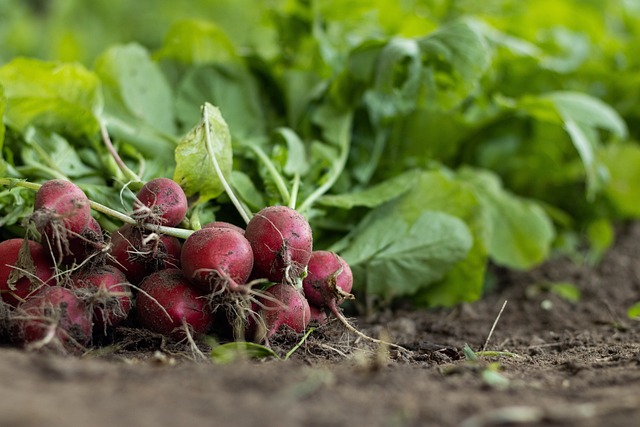


The warning was delivered by Marta Vasconcelos, a biologist affiliated with the Portuguese Catholic University, during the third event in the 2023 series of FAPESP Lectures (photo: Mirko_Fabian_Pixabay)
Published on 07/14/2023
By Maria Fernanda Ziegler | Agência FAPESP – Among the many consequences of climate change, rising levels of carbon dioxide (CO2) in the atmosphere can lead to a reduction in crop nutrients. Basically, the higher the level of CO2 in the atmosphere – and experts predict that it will continue to rise – the more glucose and other carbohydrates plants will synthesize instead of other nutrients indispensable to human health, such as proteins, iron and zinc.
Marta Vasconcelos, a biologist affiliated with the Portuguese Catholic University (UCP), began with this warning in a presentation delivered on June 30 at FAPESP. The talk was entitled “Climate Change, Plant Nutrition and Food Production”, and was the third in the 2023 FAPESP Lecture Cycle.
“The [discovery regarding the] reduction in crop nutrients was catastrophic for me because I did my PhD on rice biofortification with iron. I continued to try to improve the iron content of leguminous plants and suddenly realized the heavens were against me. I almost took this personally and decided to investigate how we could save the nutrients in our food,” Vasconcelos joked.
She is a researcher at UCP and assistant director of its Center for Biotechnology and Fine Chemistry (CBQF), where she leads the Environment and Resources Group and the Plant Nutrition and Biotechnology for Sustainability Laboratory (PlanTech). Her group works at the interface between plant and human nutrition, promoting plant-based nutrient-rich foods for more sustainable agricultural systems. She has a long history of successful leadership of and participation in projects that address crop diversification, value chains, plant nutrition and genetic resources.
“In the case of dry beans, for example, a study by my group showed that iron loss was as high as 39%, although it occurred in only six of the 18 varieties analyzed,” she said. “Farmers aren’t always aware of this kind of difference between varieties. Selection of what to plant is typically based on yield and pest resistance. It’s important to be aware that some varieties are more resilient than others in nutritional terms.”
Besides research on variability in beans, Vasconcelos presented the results of studies relating to chickpea, lentil, pea and tomato growing and nutritional contents, stressing the role played by legumes in combating the adverse effects of climate change. “Legumes are ‘natural fertilizers’ and promoters of biodiversity,” she said. “They’re crucial to the effort to diversify crops and value chains in various kinds of production systems, including agri-forestry. I think they’re a big opportunity for Brazil because you’re the world’s largest producer of beans.”
Dietary habits in Portugal and Brazil are very different, she noted. Rice and beans are the main staples in Brazil, which is the world’s largest producer of beans, accounting for 20% of global consumption. Nevertheless, food insecurity affected 77 million Brazilians in 2021. “In Portugal, 73% of our food is imported. It’s unusual to eat beans, and most people consume three times more meat, fish and eggs than they should,” Vasconcelos said.
She also referred to what she called the paradox of legumes. “In Europe, we don’t want genetically modified food. We want to reduce meat consumption and increase legume consumption. Yet we import GM produce and use it in animal feed,” she said.
Three-pronged strategy
For Vasconcelos, a three-pronged strategy should be pursued to produce nutritious food despite climate change. Nature is the first focus: here the priority is protecting and restoring ecosystems, transitioning to renewable energy, and changing consumers’ habits.
“Most of us keep on eating the same kinds of food. Do you believe our diet is different from that of our ancestors? Whether we’re in São Paulo, Lisbon or Porto, we all eat the same food. What’s worse is that we eat the same varieties of the same produce,” she said.
The second priority is innovation in production. “We should diversify crops and place more emphasis on regenerative agricultural practices. For example, we should study how plants withstand multiple stresses such as drought and rising levels of CO2. And, of course, we should [invest in] digitalization,” she said.
The third priority is working on new dietary habits. “As consumers, we should demand more sustainable, more local and more diversified food. And we should reduce our consumption of badly produced animal protein,” she said.
The presentation delivered by Marta Vasconcelos can be watched at: www.youtube.com/watch?v=xsHxOtrV4h4.
More information on the 2023 series of FAPESP Lectures can be found (in Portuguese) at: fapesp.br/conferencias2023.
Source: https://agencia.fapesp.br/41860